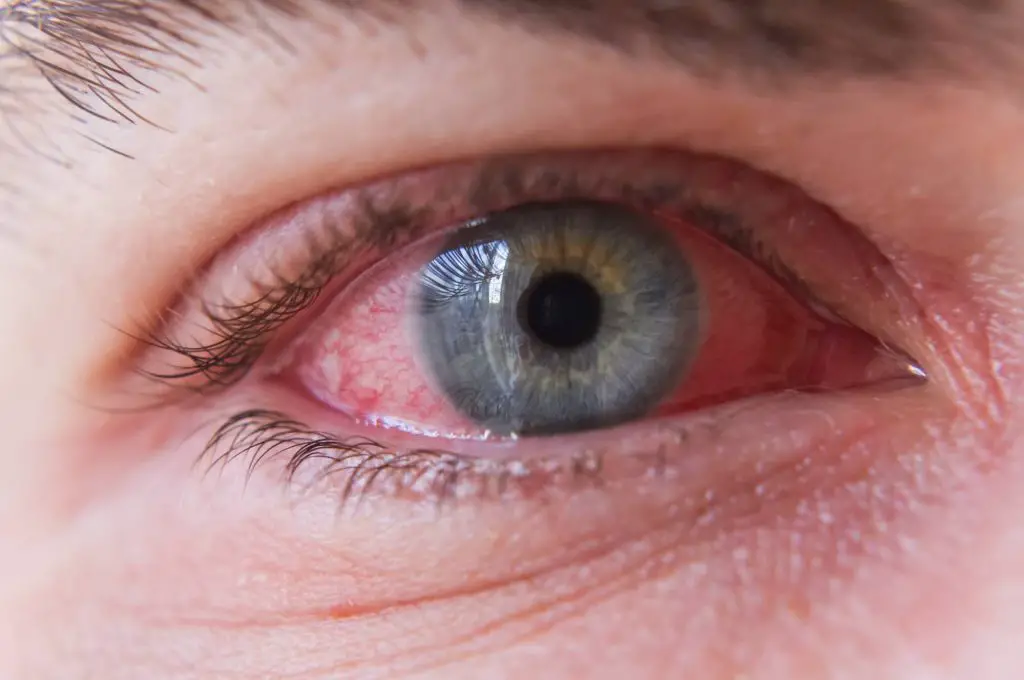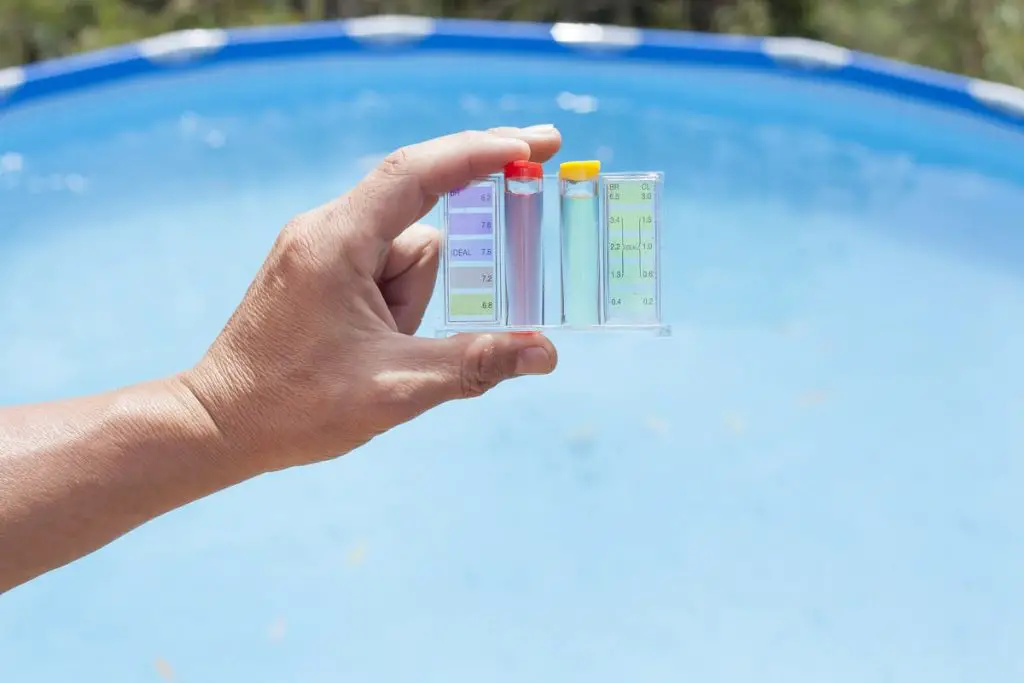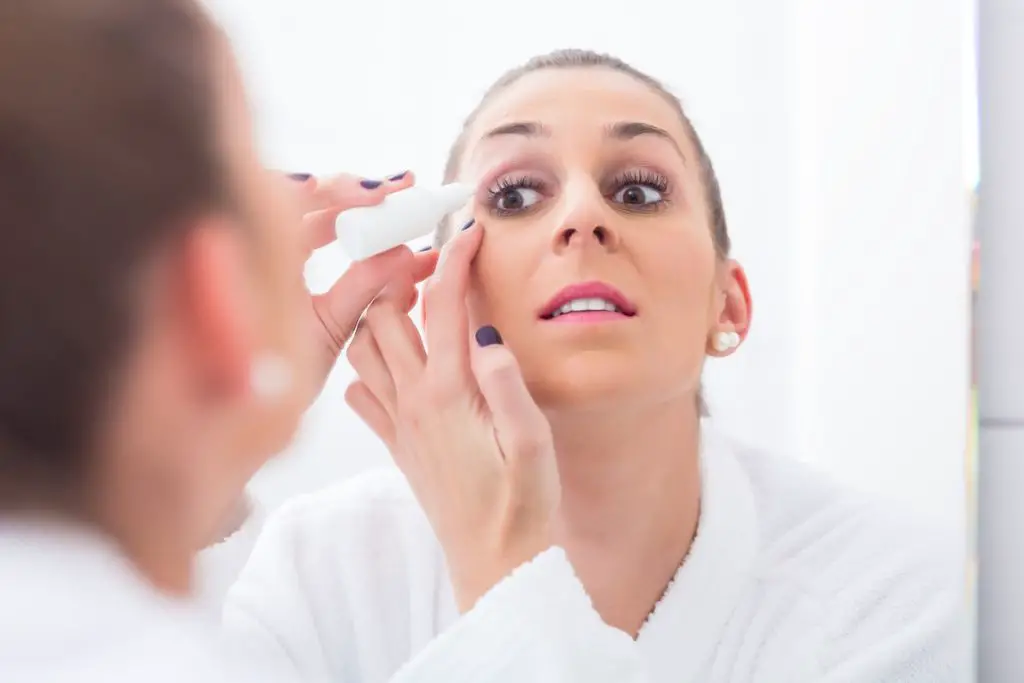We’ve all experienced the discomfort of your eyes burning after a day in the pool. There have been many times where my eyes have burned so severely that it’s put me off swimming altogether! I am one of many who have sought out ways to relieve and prevent burning eyes.
Your eyes will burn in the swimming pool if the water’s pH level is outside of the comfortable range for the human body or an imbalance of chlorine. In both cases, the eyes become irritated by either the extreme pH level or the chemicals caused by chlorine, causing a burning sensation.
By understanding why the swimming pool can cause your eyes to burn, you’re better equipped to relieve and prevent it. I’ll explain why our eyes burn in the swimming pool, as provide my top tips for relief and prevention of what we often call “swimmer’s eye.”

Why Do My Eyes Burn in the Pool?
If you find that you’re frequently getting out of the swimming pool with red and burning eyes, the explanation is pretty simple. The most likely culprit is an improperly balanced pH level in the pool water.
Why pH Levels Are Important
The pH level of liquid is measured on a scale to determine whether it’s acidic, basic, or neutral:
- Less than 7 = acidic
- 7 = neutral
- 8-14 = basic
Unsurprisingly, the body’s pH level is neutral, and around 7.4-7.8 is the optimum level for comfort. When your pool water’s pH level is outside of this very narrow range (either too acidic or too basic), it will irritate the eyes and cause the unpleasant burning sensation that we sometimes call “swimmer’s eye.”
Your swimming pool’s pH level can be thrown off balance by numerous factors such as heavy rainfall (if your pool is outside), the number of swimmers, and chemical treatments.
For your safety, you should check the pH levels of your pool water daily. I like to do it first thing in the morning before anybody has started swimming. For more information on pH, check out The Beginner’s Guide to Pool Water Chemistry.

How to Check the pH Levels of Your Pool
I have found that pH test strips are easy to detect the pH level of your pool’s water effectively. This kit provides easy-to-follow instructions:
- Dip the strip into the pool and remove it immediately
- Hold the strip level for 15 seconds
- Compare the color of the strip to the color guide on the bottle.
Not only is this water testing kit affordable, but it’s made specifically for swimming pools and can also detect the chlorine levels in the water. This is a valuable feature because improper chlorine levels can also burn your eyes.
Or, you can go the route that I went and invest in a liquid test kit which can also help you determine the proper steps to correct your water. Here’s the one I use which you can get straight from Amazon:
Why is Chlorine Added to Swimming Pools?
Overall, chlorine plays an essential role in pool water by killing germs and bacteria, thereby drastically reducing your risk of contracting water-borne illnesses.
However, when your pool’s chlorine levels are thrown out of balance, this can contribute to the burning eyes that you might experience when you’re taking a dip.
The problem is that chlorine mixing with water creates a harsh chemical compound known as chloramines. These chloramines can build up in the water and air (particularly in indoor pools where there is poor air circulation), and this build-up causes unpleasant symptoms like irritation of the skin and eyes.
How Do I Check My Pool’s Chlorine Levels?
Again, the chlorine levels can be easily tested with special test strips like those in the test kit mentioned above. I have found that keeping my pool’s chlorine balanced not only helps prevent swimmer’s eye, but it keeps the pool clean too!
Does Chlorine Permanently Damage the Eyes?
Chlorinated pool water can strip away the tear film on your cornea, and removing this protective barrier leaves your eyes prone to infections like conjunctivitis.
In extreme cases, improper chlorine levels can cause an amoeba or parasite to enter the eye. For example, acanthamoeba keratitis can lead to permanent vision damage, corneal ulcers, and severe infection. The risk of permanent eye damage makes it vital that you monitor the chlorine levels in your swimming pool.

How to Stop Your Eyes from Burning After Swimming
After swimming, the burning sensation in your eyes can last for hours and become overbearing. Thankfully, there are some solutions I have found that effectively relieve burning eyes.
Flush Your Eyes With Cool Water
While this may not provide immediate relief, it’s an essential first step to ensure that you rinse any lingering irritants from the eye. Additionally, I find that the cool water is very soothing.
These eyewash cups are leak-proof and will hold around 10ml of water, as well as being completely hygienic. Simply hold the cup over your eye and allow the water to wash away any leftover irritants. Pat your eyes dry with a soft towel afterward.
Try Using Eye Drops
First, try sterile saline solution eye drops. They will rinse out irritants while simultaneously lubricating the eye. If this provides no relief and your eyes continue to burn, you should use artificial tears/lubricating eye drops.
I tend to use one or two drops of artificial tears every 4-6 hours, and this keeps burning eyes to a minimum by ensuring that my eyes are well hydrated.
Use a Cold Compress
If you’re experiencing inflammation alongside your burning eyes, a cold compress should provide you with some relief from these unpleasant symptoms.
This cooling eye mask can be placed in the freezer to treat puffy eyes. It fits snugly with a velcro strap and can be worn over the eyes for up to twenty minutes. It also works as a heated compress, so it’s an excellent multi-purpose purchase.
Ways to Prevent Your Eyes from Burning in the Pool
Ultimately, prevention is a better method than attempting to soothe your burning eyes after you go swimming. Here are some easy ways to prevent my eyes from burning in the pool.

Wear Goggles
In my experience, this is the most effective method; protective goggles will prevent chemicals and other irritants from entering the eyes so they won’t burn. If you’re a frequent swimmer, you’ll be wearing goggles a lot, so there are some things you should consider while shopping for a pair:
- Good fit: wearing goggles is pointless if they let in water because they don’t fit properly!
- Comfort: they shouldn’t exert too much pressure on your eye sockets/the bridge of your nose
- Anti-fog/anti-scratch
These swim goggles are the ideal shape, offering wide vision and minimizing discomfort on your nose. Braylin guarantees that the goggles do not leak, and the anti-fog feature makes them perfect for frequent swimmers.
Regularly Check Your Pool’s pH/Chlorine Levels
We’ve mentioned this point already, but you’re far less likely to leave the pool with burning eyes if the water’s pH and chlorine levels are well-balanced. Use a water testing kit every few days to keep track of these.
Use Eye Drops Before You Swim
While you can use eye drops to lubricate the eye after a swim, using some artificial tears beforehand can help to protect the tear film of your eyes. This means that when you swim, you will be better protected from the irritants that cause your eyes to burn.
Take Your Contacts Out
If you wear contact lenses, you should never wear them while swimming. Water can become trapped between the lens and your eye, causing the eye to become oxygen-deprived and creating a breeding ground for infection/bacteria.
If swimming with your natural vision is not safe, speak with your optometrist about prescription goggles.
Final Thoughts
Overall, my tips and explanation for burning eyes in the pool should help you get back to swimming without worrying about eye irritation. You can both prevent burning eyes and relieve them to enjoy a better overall swimming experience.
